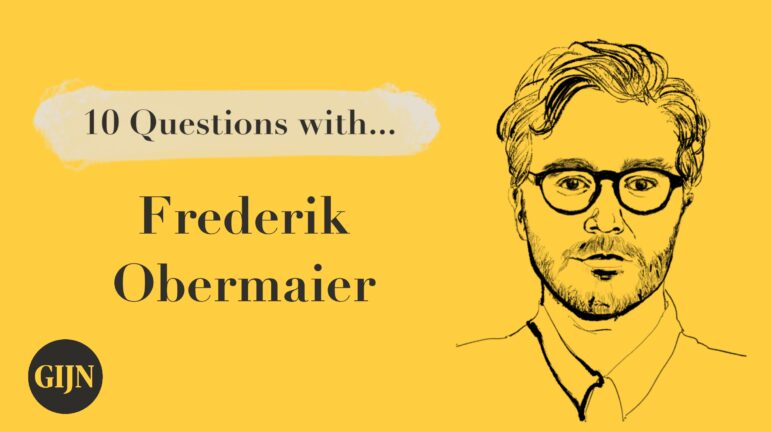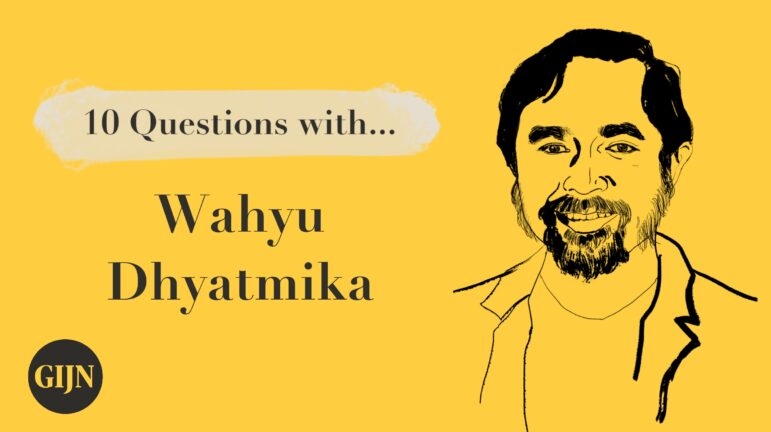

Illustration: Smaranda Tolosano for GIJN
What I’ve Learned: Lessons and Advice from a Veteran of the Panama Papers Investigation
Read this article in
Frederik Obermaier was a reporter at the German newspaper Süddeutsche Zeitung when a whistleblower going by the pseudonym John Doe reached out with an enticing message: “Hello, this is John Doe,” the source wrote. “Interested in data?”
In the end, it was quite a haul: 11.5 million files, 2.6 terabytes of data, emails, and letters that revealed how a Panamanian law firm had helped prime ministers, business people, drug traffickers, and weapons dealers hide their money. Realizing the story was “simply too big for one news outlet,” Obermaier and his colleague Bastian Obermayer approached the International Consortium of Investigative Journalists (ICIJ), which created a team of 100 media partners to dig into a global story of “financial chicanery and political corruption.”
What eventually became known as the Panama Papers investigation heralded a new style of collaborative investigative journalism based on large datasets and leaks exposing the secrets of people and industries that would rather their world be kept hidden. Obermaier’s projects since then have included the Paradise Papers, Offshore Leaks, Suisse Secrets, and the Pegasus Project. In addition to being a co-founder of the Anti-Corruption Data Collective, a member of ICIJ, and a board member of Arab Reporters for Investigative Journalism (ARIJ), Obermaier focuses on covering corruption, tax havens, and extremism: one investigation into the Austrian far-right led to the resignation of the country’s vice-chancellor.
The Panama Papers team won the 2017 Pulitzer Prize for explanatory reporting, and Obermaier was also part of the FinCEN files team that was named a Pulitzer Prize finalist in 2021. With his long-time collaborator Obermayer, he founded the investigative start-up paper trail media in 2022, bringing together a team of European journalists to work in print, online, podcasts, and video from their base in the German city of Munich.
1. Of all the investigations you’ve worked on, which has been your favorite and why?
Frederik Obermaier: That’s easy: the Panama Papers, where 400 journalists were working together to reveal the secrets of the rich and the powerful. The project proved the power of collaborative journalism. The Panama Papers changed my life and what is by far more important: it changed the world. We owe the whistleblower who called himself “John Doe” a lot. It was a huge relief, when my colleague Bastian Obermayer and I were able to speak to this person last year and learned that they are living in safety. That’s not to be taken for granted given that this person, among others, exposed the secret dealings of Vladimir Putin’s inner circle.
2. What are the biggest challenges in terms of investigative reporting in your country/region?
FO: Lack of finances, disinformation, and strategic lawsuits against public participation [SLAPP cases]. With great horror I see verbal and physical violence increasing against journalists around the world, the murder of reporters has become a new normal. In 2017, I met the brave journalist Daphne Caruana Galizia in Valletta, the capital of Malta. She was nervous and wanted to change seats in the restaurant to better be able to see the entrance. Some months later she was killed by a car bomb. Or take Ján Kuciak: he was an amazingly talented muckraker — and was shot dead five years ago, together with his fiancée. In 2021, it was the Greek journalist Giorgos Karaivaz who was killed in broad daylight. We shall never forget Daphne, Ján, and Giorgos, we owe it to them and their families. And we can best honor them by continuing to shed light on abuse of power, organized crime, and crimes against humanity.
3. What’s been the greatest hurdle or challenge that you’ve faced in your time as an investigative journalist?
FO: Finding the right balance between work and my private life. Investigative journalism is not a nine-to-five job. Often sources want to meet in the evenings, on weekends, or during vacation. Calls for international team efforts are often scheduled late afternoons, evenings, or even in the night in Germany. That’s challenging to say the least.
4. What is your best tip or trick for interviewing?
FO: I fear you ask the wrong journalist. I do not consider myself a good interviewer, but I always try to be prepared. I imagine there is nothing more annoying than being interviewed by a journalist who does not get the facts right.
5. What is a favorite reporting tool, database, or app that you use in your investigations?
FO: There are so many. OCCRP’s Aleph, ICIJ’s Offshore Leak database, and Microsoft Excel, to name just a few. But there is one that outshines all of them: Signal. Nearly every collaboration these days is organized via Signal groups. The app allows confidential communication during a time in which surveillance is getting tighter and tighter. But if one of Signal’s programmers is reading this: Please… allow more chats to be pinned, allow them to be organized by topic, and allow users to pin individual messages.
6. What’s the best advice you’ve gotten thus far in your career and what words of advice would you give an aspiring investigative journalist?
FO: Give credit! Investigative journalism is a team sport — and every single team member plays an important role. It costs an outlet nothing to put another name on the byline, but for the journalists whose names appear there, it often means a lot. And there is also a positive side-effect: If you give credit, you get credit.
7. Who is a journalist you admire, and why?
FO: There are many. Marina Walker Guevara and Gerard Ryle, the hearts and brains behind ICIJ’s Panama Papers project. They truly lifted collaborative journalism to new heights. Maria Ressa and her “Manangs” [female co-founders] who started Rappler and bravely stood-up against a brutal autocrat. Paul Radu and Drew Sullivan, who are leading — and protecting — an amazing group of journalists who work in some of the most dangerous places on earth. And of course: Laurent Richard and Sandrine Rigaud of Forbidden Stories, who created a network of devoted journalists serving as an antidote against all the forces doing harm to journalists. They have proven that someone might be able to kill the messenger, but not the message.
8. What is the greatest mistake you’ve made and what lessons did you learn?
FO: Unfortunately there is one mistake I have made numerous times: I regularly underestimate the amount of reporting that will be needed after publishing a big story. After one investigation, in which we uncovered that the leader of Austria’s far-right Freedom Party FPÖ had promised government contracts to a woman both claiming to be a millionaire and the niece of a Russian oligarch close to Vladimir Putin, I planned a family weekend away. I ended up watching the press conference of Austria’s chancellor on the cell phone of a stranger in front of an ice cream shop and had to brush off the newsroom colleague who asked for more follow-up reporting.
9. How do you avoid burnout in your line of work?
FO: Investigative journalism is sometimes like a drug. In the right dose, it gives you a good feeling. You feel you can change the world, at least a bit, for the better. But if you take too big a dose, it can eat up your whole life. In my short career I have seen too many colleagues burn out. I try not to follow in their footsteps, by doing sports and spending as much time as possible with my loved ones. I learned to listen to my body — to put away the cellphone, play with my kid, read a book.
10. What about investigative journalism do you find frustrating, or do you hope will change in the future?
FO: We are living in golden times for investigative journalists. Innovative teams are developing new tools, and brave journalists are building new collaborations leading to more scandals being revealed. Investigative journalism is becoming younger, more female, and more diverse. I am therefore not worried, but the crooks and criminals, autocrats and oligarchs should be.
Additional Resources
How Collaboration Enables Transcendent, World-Changing Journalism
What I’ve Learned: Lessons and Advice from The Caravan’s Vinod K. Jose
Lessons Learned from Investigative Journalist Hayatte Abdou, from the Comoros
 Laura Dixon is an associate editor at GIJN and a freelance journalist from the UK. She has reported from Colombia, the US, and Mexico, and her work has been published by The Times, The Washington Post, and The Atlantic. She has received fellowships from the IWMF and the Pulitzer Center.
Laura Dixon is an associate editor at GIJN and a freelance journalist from the UK. She has reported from Colombia, the US, and Mexico, and her work has been published by The Times, The Washington Post, and The Atlantic. She has received fellowships from the IWMF and the Pulitzer Center.











